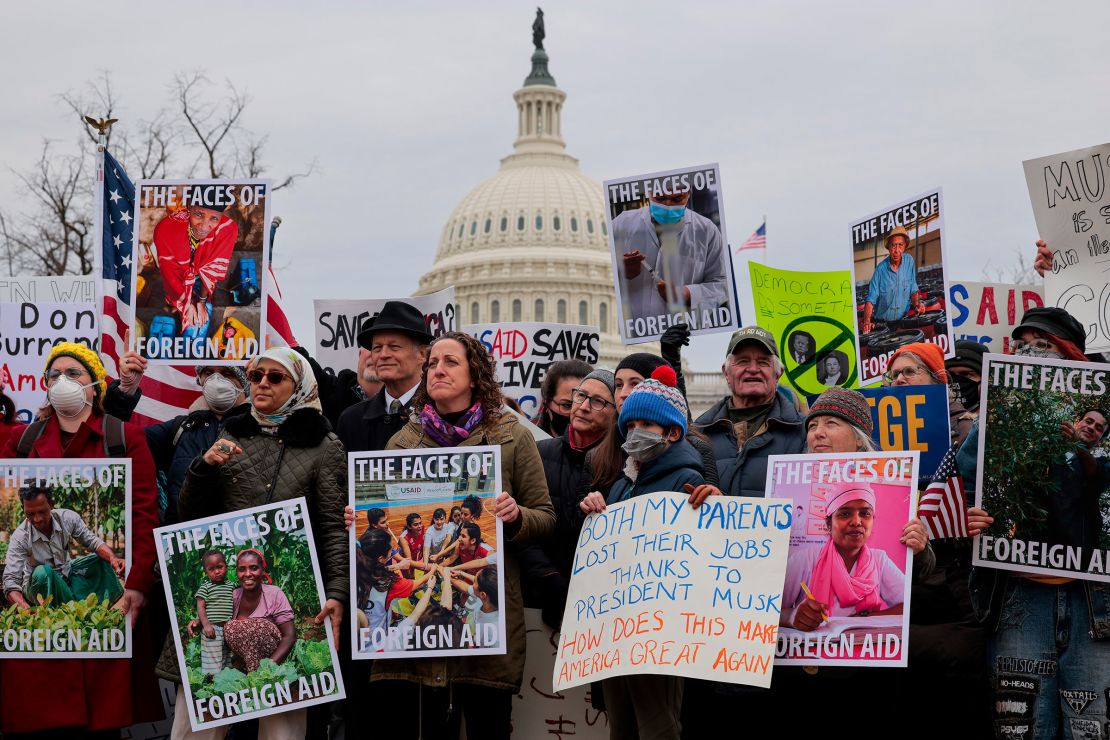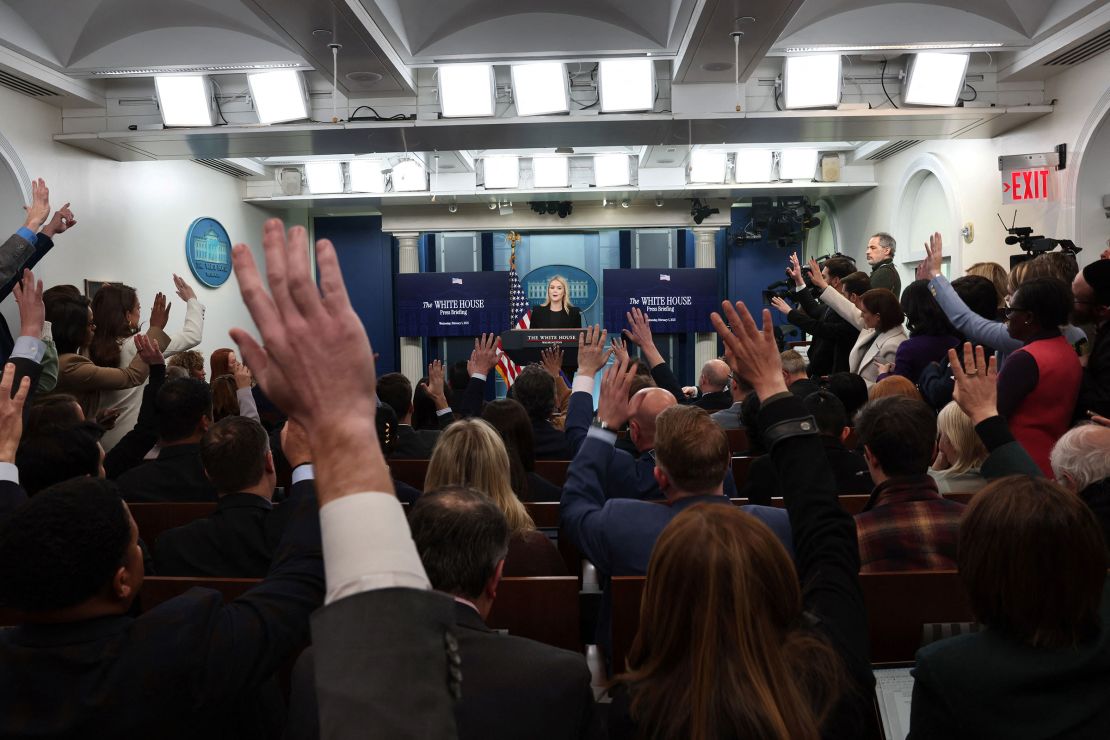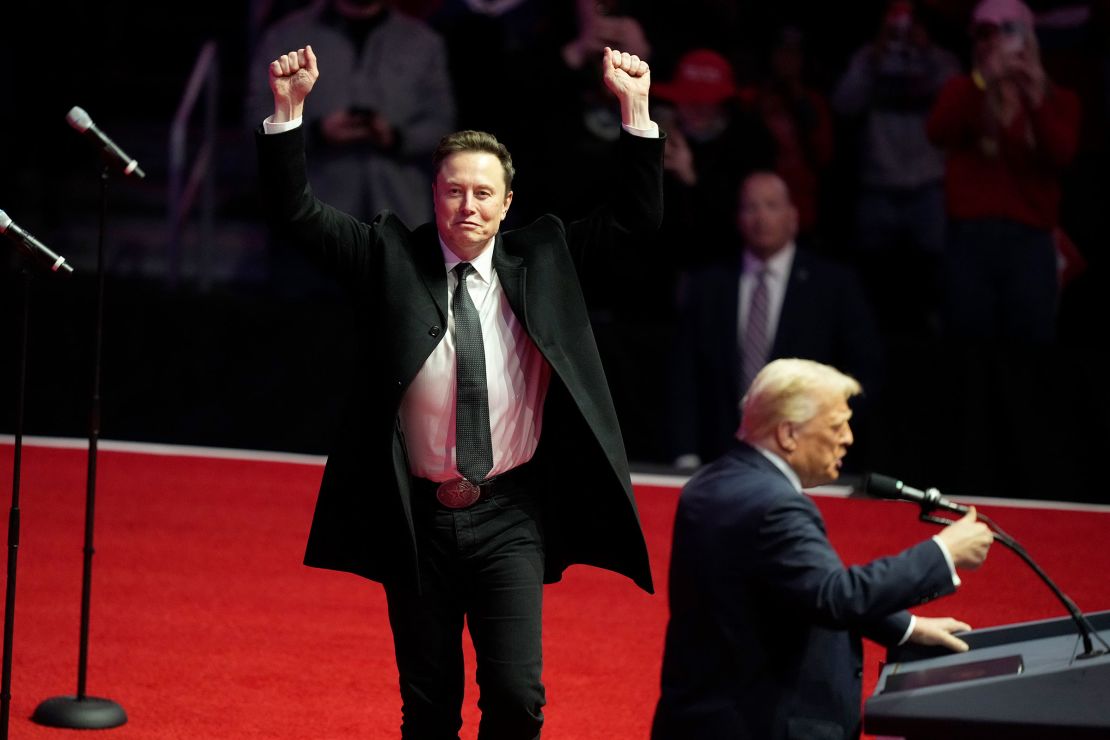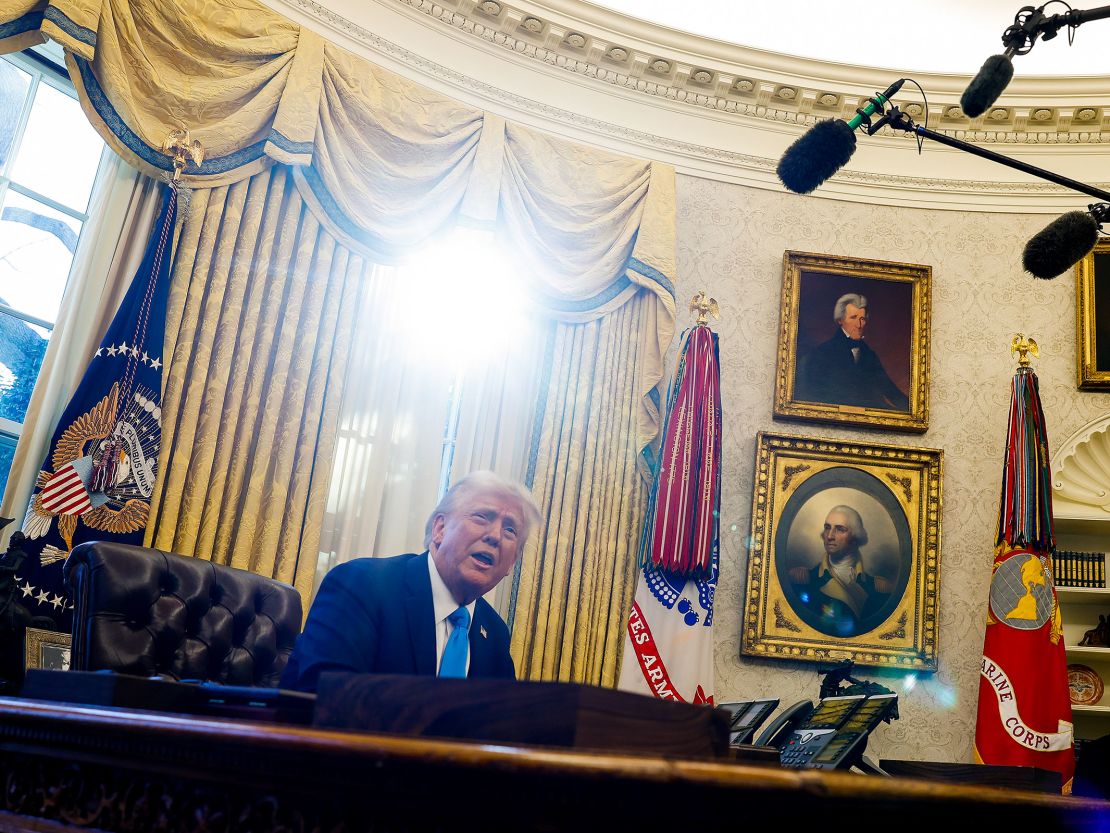CNN
—
A month into Donald Trump’s first term, the president’s then-political sage Steve Bannon coined a doctrine to explain the conservative wrecking ball now demolishing the US government: “the deconstruction of the administrative state.”
It took eight years, but the theory is becoming reality, and could portend a fateful reshaping of American governance under a mighty presidency that was never envisaged by the founders.
Trump and his merchant of chaos Elon Musk are pummeling federal agencies, targeting bureaucrats, clawing back spending approved by Congress, buckling the world order and busting trade pacts.
They are following a playbook developed by movement hardliners, dismayed at the missteps and lost focus of Trump’s first term, who are determined to use a potentially short window on power to forge irrevocable change.
Once again, Trump is raising questions at a velocity that leaves other branches of government, his opponents and voters struggling to grasp what’s happening and unable to resist.
Five key questions or trends are emerging that will help to define his second term.
- Is growing outrage and fear justified? To what extent are the shocks rattling Washington simply the signs of a hyper-committed new administration implementing a mandate to transform how the country is run and who runs it?
- Or, are Trump’s tactics becoming an all-out assault on the Constitution from a president who believes he has unlimited authority and who mocks checks and balances meant to ensure commanders in chief are not kings?
- Musk, wielding vast, mostly invisible power, working deep beneath the hood of the federal government, is especially problematic. He’s not elected or confirmed by Congress and seems accountable to nobody — perhaps not even Trump.
- And there are multiple and growing signs that institutions like the FBI, CIA, DOJ and federal agencies that Americans have relied upon to deliver justice and keep them safe, prosperous and healthy are now mere tools of Trump’s whims.
- Who is going to stop any of this? After last fall’s widespread defeat, Democrats are toothless. Republicans who run Congress have neutered their own branch of government to appease an all-powerful president. Court cases are coming but can’t keep up with Trump.

A trail of shocks and uproar
The scope of the Trump power play is staggering. And it’s possible much more is happening behind the scenes that the public can’t see.
Musk, the world’s richest man, is boasting that he put USAID — an agency that feeds some of the world’s poorest, most desperate people and has saved millions of lives — “in the wood chipper.” USAID employees have been ordered home from overseas. The Tesla chief and his whizz kid crash teams are roaming inside the federal nervous system with the capacity to access sensitive Treasury payment systems and are seemingly able to force out top managers and shut out employees.
The White House halted the work of the Consumer Financial Protection Bureau, which is tasked with shielding consumers from financial abuses. Trump has made clear he wants his incoming Education Secretary Linda McMahon to orchestrate her own department’s demise. The administration has offered many federal workers a ‘buyout,’ and CNN reported the government plans to dismiss large numbers who don’t take the offer by a Thursday deadline.
As part of a supposed quest to de-weaponize the Justice Department and FBI, the bureau has handed over to Trump aides information on 5,000 employees who worked on January 6, 2021, cases. Trump told his new Attorney General Pamela Bondi he wants “impartiality” on Wednesday — in a scene in the Oval Office that left no doubt that his definition of the word required complete adherence to his point of view. Trump’s chosen FBI enforcer Kash Patel hasn’t even arrived yet, but he appears likely to be confirmed by the Senate as the retribution agenda gathers pace.

White House insists Trump is simply enacting a mandate
Millions of Americans voted for a candidate who argued that the federal government was not responding to their needs – after a grueling chapter of history marked by financial crises, the hollowing out of the manufacturing base, foreign wars and punishingly high inflation.
Trump’s aides dismiss a tide of panic and condemnation about his lightning-fast start to his second term. They argue he’s doing exactly what Americans wanted.
“President Trump was elected with a mandate from the American people to make this government more efficient,” White House press secretary Karoline Leavitt said Wednesday. He campaigned across this country with Elon Musk, vowing that the tech billionaire was going to head up the Department of Government Efficiency, and that the two of them, with a great team around them, were going to look at the receipts of this federal government and ensure it’s accountable to taxpayers.
“That’s all that is happening here,” Leavitt said.
Trump’s brazen approach, however, seems to go much further than Leavitt’s characterization. And he doesn’t get much benefit of the doubt as a twice-impeached president who tried to wreck democracy to stay in power in 2021.
And many constitutional experts are worried that Trump, and Musk especially, are simply creating authority for themselves that does not exist.
“The danger in what Musk is doing is that he is openly defying the United States Constitution. Under that document, Congress has the power of the purse, and the executive is charged with spending money allocated by that body,” said Corey Brettschneider, author of “The Presidents and the People: Five Leaders who Threatened Democracy and the Citizens who Fought to Defend it.” “But Musk is simply determining himself, with Trump’s encouragement, what money should be allocated or not. This is not just likely defying the court orders pausing the attempted freeze by the executive. It is an open defiance of Congress’ legitimate power.”

From his first moments back in office, Trump has challenged the limits of presidential power that prevailed for decades. With a sweep of his pen, he sought to outlaw birthright citizenship despite the plain language of the Constitution making clear it’s a quintessential American right. (A second federal judge on Wednesday blocked his executive order, which will likely be appealed.)
But that Trump Day One order was just one example of him claiming massive authority that he probably does not possess. And it hints at the threat that his unfettered governance poses in the long term. If every president came to office and simply overwrote or ignored the tapestry of two-and-a-half centuries of laws, Americans would not — in the words of Trump on January 6, 2021 – “have a country anymore.” Presidents can work with Congress to pass new laws, or to campaign for federal lawmakers and the states to amend the Constitution on issues like birthright citizenship — but they can’t just ignore the statues and write new laws they like.
This critical moment in history is a perfect storm uniting a president with a highly expansive view of executive power and a movement of conservative operatives, officials and scholars who have long promoted a vision of the presidency with almost no limits.
Trump often denied that he had read or knew anything about Project 2025, the blueprint for a Republican transition and presidency shepherd by the Heritage Foundation. But his belligerent use of power early in his second term closely follows many of the recommendations in the plan.
In a section of Project 2025 covering the presidency, Russ Vought, who is on the verge of being confirmed to run Trump’s budget office, argued it was time to wrest back the “enormous power” of the presidency from departments or agencies, staff or administrative bodies and non-governmental organizations close to the government. Vought’s case rests on the premise that unelected bureaucrats inside the permanent civil service frustrate a GOP president’s agenda, as many conservatives believe happened in his first term. And it explains exactly what Trump is doing.
Vought wrote that power must rest with the president’s political team – and, by implication, advisers like Musk. “It is the president’s chosen advisers who have the best sense of the President’s aims and intentions, both with respect to the policies he intends to enact and with respect to the interests that must be secured to govern successfully on behalf of the American people,” Vought wrote.

How Trump is using vast powers of his office to evade accountability
Some observers have framed the shock-and-awe start of Trump’s return to power as a deliberate strategy to overwhelm the circuits of his opponents and to make it impossible to comprehend the scale of his ambition.
It’s working. Especially since Democrats, in the minority in both chambers of Congress, can at best only delay the administration’s forward march. And Republicans seem ready to cave to anything Trump wants.
House GOP Speaker Mike Johnson on Wednesday rejected the idea that Musk and Trump were infringing Congress’ power to decide spending. “We see this as an active, engaged, committed executive branch authority doing what the executive branch should do,” he said. “This is not a usurpation of authority in any way. It’s not a power grab.”
But Trump’s intentions run deeper than bewildering Congress and the media. They are also outracing the courts. Tom Dupree, a former deputy assistant attorney general, paraphrased the strategy this way to CNN’s Jake Tapper: “We are going to do whatever we want and we will see if the courts stop us.”
It is already inevitable the administration will face multiple lawsuits all the way up to the Supreme Court over its stunningly broad interpretation of executive authority. Even if Trump succeeds in winning only a fraction of the cases before the conservative majority he built, he will bolster the office of the presidency. And in the interim, he will have transformed the government.
“Is this a kind of coup?” asked Brettschneider. “We are seeing in real-time how the fundamental constitutional requirements can be evaded given the vast power of the executive. That might not be a violent collapse of the system but it does resemble the demise of the rule of law we see in authoritarian countries.”
Bannon, who charts the mayhem during hours of daily podcasts, has a new buzz phrase to describe it: “Days of Thunder.”


